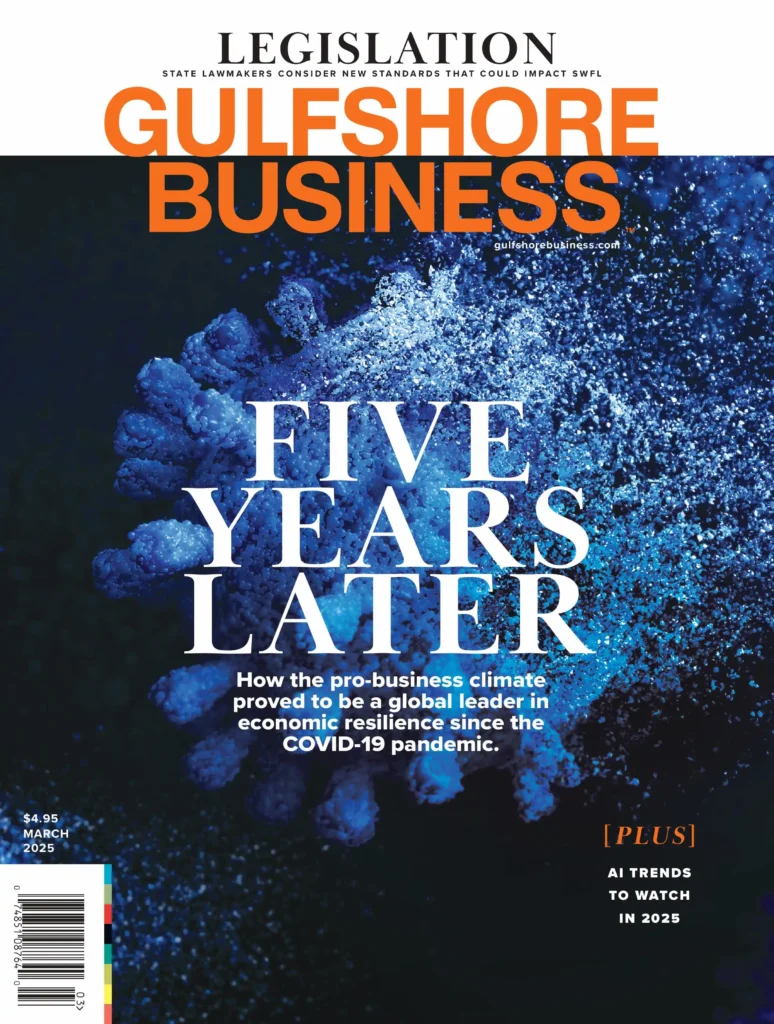The business of comedy in Southwest Florida is nothing to laugh about. It’s an industry that draws thousands of people to large comedy clubs and pop-up one-nighters in restaurants, bars and even an American Legion Post, to eat, drink and laugh.
“It’s a lot of hard work and lots of money, it doesn’t come cheap. There’s no secret sauce,” says Brien Spina, who opened Off The Hook Comedy Club 20 years ago.
Off The Hook in Naples; Snappers, formerly Laugh In, in Fort Myers; and Visani, in Port Charlotte, are the large, long-established clubs in Southwest Florida that attract the biggest club performers.
Some of the more popular pop-up businesses — Caloosa Comedy Productions, Comic Cure, the Library Comedy Club, Coastal Island Comedy, Venturino’s Comedy Club and Florida Repertory Theater — are newer ventures that fill a niche mostly for local, regional and lesser-known comics. They help restaurants, bars, theaters and nonprofits add to their bottom lines.
 “It’s pretty much the golden age of comedy right this second, so we’re going to ride the wave — because everybody and their mother is doing comedy, either full-time comedy, pop-up comedy, one-show-a-month comedy,” says Leonard Kure, head booking agent for the Comedy Zone based in Charlotte, North Carolina. Comedy Zone books comics for Visani and the Florida Repertory Theater in Southwest Florida.
“It’s pretty much the golden age of comedy right this second, so we’re going to ride the wave — because everybody and their mother is doing comedy, either full-time comedy, pop-up comedy, one-show-a-month comedy,” says Leonard Kure, head booking agent for the Comedy Zone based in Charlotte, North Carolina. Comedy Zone books comics for Visani and the Florida Repertory Theater in Southwest Florida.
Spina and Nabil Basta, owner of Snappers in Palm Harbor and Fort Myers, started their clubs long before this “golden age.” Basta opened in Palm Harbor in Pinellas County in 1988; Spina opened his club in 2005 on Marco Island.
They are the survivors.
“If you’ve looked at the clubs that have been in Florida over the last 20 years, you’ll probably see several thousand that have opened and closed,” says Richy Leis of Cape Coral. Along with his brother, he owns Comic Cure, a company that books comedians and consults with clubs, restaurants and nonprofits about how to make money with comedy.
Snappers’ Basta said he had a passion for restaurants that offered a variety of entertainment, something that wasn’t happening at the time.
“You’d either go to eat or to live entertainment,” he says.
Spina already owned a restaurant on Marco Island, when he decided the sleepy island needed some nightlife. He was from Boston, where comedy clubs flourished, and he thought everyone does music entertainment. “I thought, ‘Hey, let’s try it,’” he says.
He moved the club to Naples in 2013, after outgrowing the Marco location; a move that made sense because most of the customers came from Naples and Fort Myers. He said his audiences travel on average 20 to 40 miles.
Snappers in Fort Myers has changed ownership several times. Basta bought it almost three years ago. His rebranding of the club is a work in progress: He’s finding out what the Fort Myers market wants. Basta started with 100 seats because that’s all the staff could handle. The venue seats up to 150, but he said his biggest problem has been finding good help.
He has changed the menu three times, looking for the perfect customer fit, and is still searching for the right price point in Fort Myers. He has had the most success with dinner and the show for $36 on weekdays and $38 on weekends. “It’s a process, and the process takes time,” he says.
 Food is an important part of the profit equation. Snappers and the other clubs make money three ways: tickets, beverages and food sales. Sometimes, the headliner gets all the money from ticket sales and the clubs only make a profit from food and drink sales. Clubs usually have a two-item minimum.
Food is an important part of the profit equation. Snappers and the other clubs make money three ways: tickets, beverages and food sales. Sometimes, the headliner gets all the money from ticket sales and the clubs only make a profit from food and drink sales. Clubs usually have a two-item minimum.
The audiences are intended to laugh at the comedians but not the food, so the clubs offer sophisticated menus.
“We do everything in-house,” Off the Hook’s Spina says. “We make our own doughs, sauces, cut our own steaks.” The kitchen even bakes the cakes on the menu.
Owners Kelly Crossett and Eric Andreas purchased Visani in 2015, 10 years after it opened. Visani is more restaurant-oriented than some of the other clubs — it may be known as much for its steaks as its comedy — and has a section separate from the comedy club where people can just go to eat. Kure said it has the best food of all the restaurants the Comedy Zone owns or books for.
Visani also is different because the owners don’t book their shows. Crossett and Andreas kept Comedy Zone as the bookers after they bought the club.
Booking comedians is the hardest part of the job. It takes the most work, and is about building relationships, said Basta, who does all his club’s booking. “Lots of politics goes into it.”
The club owners said social media has changed the landscape and created new challenges. Today, it’s TikTok and YouTube moving the needle.
“It’s incredible — there’s guys that sell out that I didn’t hear about six months ago. It’s a wild, wild world,” says Spina, who does all the booking for his club.
You can estimate how many tickets are going to be sold by the number of followers and views a comedian has online, he said.
“We don’t even know who we’re booking, but we’re selling out,” Comedy Zone’s Kure says.
Clubs don’t have to spend much money promoting the shows, Kure said, because the comics do their own promotion with their social media.
Spina called Southwest Florida an amazing market because he can bring in comics who will attract the 60-year-old to 80-year-old audience, and comics to attract the 18-year-old to 25-year-old audience.
“We can sell out either way,” he says. “It’s really a wide range, broad range.”
Comic Cure’s Leis is one of the reasons for the number of pop-ups. He moved to Cape Coral during the COVID-19 pandemic and has been booking shows at local bars, restaurants and nonprofits. Southwest Florida is a small part of his business, he said, as Comic Cure books theaters in Boca Raton, the Philadelphia area and southern New Jersey, where his brother lives.
 “It’s a business; it’s not just fun,” he says.
“It’s a business; it’s not just fun,” he says.
Comedy Cure puts on its own comedy festivals and has been involved with more than 200 shows in Southwest Florida, and three or four haven’t sold out, Leis said. He’s worked with Rusty’s Raw Bar and Rumrunners — which General Manager Joe Henning said has been putting on shows once a month for almost two years, held at lunchtime during the tourist season and at night in the summer. They’ve been a huge hit, Henning said. The room seats 120 people and all the shows have been sellouts.
Comedy Cure gets the money from ticket sales and the restaurant makes its money selling food and drinks.
“It’s super easy for us,” he says. “We love Richy.”
The agreement and the results have been the same at Rusty’s Raw Bar in Cape Coral. The restaurant offers shows during months there’s a fifth Thursday.
“It’s been very successful,” says General Manager Stephanie Garber. “We’ve had great turnouts.”
Rob Churchill, who owns Caloosa Comedy Productions, is having the same success at Rosalita’s on Sanibel. He started producing shows at the restaurant last year, and the shows during the tourist season have sold out. This season, he is offering three nights of shows with national comics twice a month. He said he could add more shows in January.
The restaurant seats about 70 people, said Kim Radloff, the general manager. Rosalita’s gets about 10% of the ticket sales and all beverage and food sales, she said.
Churchill is expanding off the island this year, booking shows for the Bay Street Yard in downtown Fort Myers and looking to add a show on Fort Myers Beach.
Larry Venturino opened Venturino’s Comedy Club in Estero last January at the Embassy Suites. He usually has shows on Monday, Tuesday or Wednesday, when the larger clubs are closed. Most shows cost $20.
“We might not get the biggest names in comedy, but we get quality acts,” he says.
Gordon Meyers said the same thing. His comics mostly are from Florida, but they are quality performers.
He runs the Library Comedy Club in the Four Points Sheraton in Punta Gorda and has shows once a week during season and every other week the rest of the year. He keeps the ticket sales; the hotel makes money from food and drinks. The room seats 60, and 60% to 70% of the audience order meals, he said.
“It’s a bit of a niche; I do make a little bit of beer money, as I call it. But I’m not looking to expand or to compete with any other club.”





